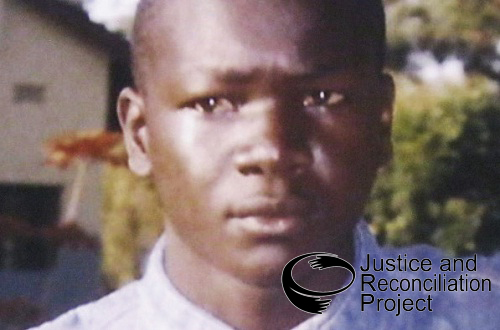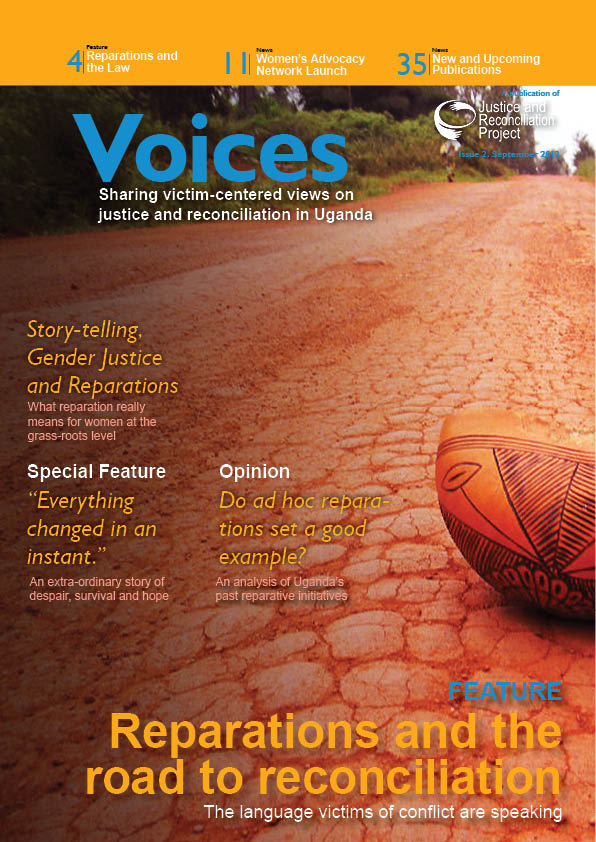In the last few months, the ‘Right to Know’ campaign has formed a central part of JRP’s work. Voices Magazine sat down with JRP Programme Coordinator, Boniface Ojok, to get his insight on the campaign, its purpose and the hopes for the upcoming months.

Voices Magazine: Could you briefly tell us the history of JRP?
Boniface Ojok: JRP started in around 2004 at a time when the discussion around justice and accountability hit the floor in Northern Uganda, and then the issues were around peace versus justice, traditional justice versus international justice processes and the attempts being pursued at the national level by Ugandans for blanket amnesty.
So then, the discussion was centred around how do we pursue meaningful accountability process? JRP came in to add a unique perspective of how do we bring in voices of the victims in this discussion. This is why we always advocate for the inclusion of locally sensitive, but also culturally relevant approach to Transitional Justice for Northern Ugandans. That is the premise upon which JRP was founded around 2004/2005. But then more fundamental was our involvement in the peace process in 2006, particularly the accountability and reconciliation agenda that was discussed in Juba.
Since then we have been following and trying to engage as widely as possible, not only with the victims of conflict in Northern Uganda but also with those who should be trying to pursue a relevant mechanism in terms of Transitional Justice, with Government of Uganda and also regional and international bodies that can help the transitional justice process in Uganda,
VM: Talking about engagement with victims in Northern Uganda, how would you describe the situations of persons that are still missing as a result of the conflict?
BO: The ‘missing persons’ issue is a very crucial area that we as practitioners in Northern Uganda should begin to pay much more attention to. One thing to note is that the discussion around missing persons has never been on anyone’s agenda, but I think in the past few months we have seen some initiatives and we have seen some momentum generated from civil society organisations and local organisations such as CAP Uganda to try and raise the awareness that the issue is real. Also, at JRP by engaging with victims on the idea of truth-telling at the local level is a clear testimony that missing persons should form part and partial of an agenda for truth-telling in Uganda.
In our studies on truth-telling we were able to find out from people that look, indeed people want to know something about what happened to their missing persons, their spouses, children and siblings. So ideally when speaking about truth-telling process, one fundamental aspect that ought not to be ignored for the case of Northern Uganda is where is the missing persons’ debate here?
Right from 1986 when this conflict began, we have had people gone missing either have to being unaccounted for because of security agencies in Uganda or the rebels. So then till now we have witnessed situation where victims have remained silent, but not silent because they are happy, silent because they can’t be given the opportunity to come out and express their grievance over their loved ones gone missing. So I think the question of missing persons remains an integral component of the truth-telling process in Uganda.
VM: Talking about these families who have persons still missing, what would you describe as some of the most important needs to these families who are going through every day with the knowledge that they don’t know where their relatives are?
BO: I think for one, families of the missing living with the pain and agony of their loved ones gone missing is a very terrible scenario. Imagine an orphan left behind together with other siblings in the absence of their bread winner, living on a day by day basis for all these years is really something beyond which I can explain. For that matter, I think if you are looking at the whole question of Transitional Justice, the whole question of truth-telling, for instance, and ignoring the fact that the missing persons should be talked about, then we are really heading into a very difficult scenario.
Take for instance abductions that have happened. Plenty of children, elderly people or people with energy to carry load on their head, people who served as soldiers in the LRA, as an example, how many are they? Unfortunately we don’t have the records. They really constitute a big number of people who went out there and were either killed or up to now no one knows their whereabouts.
Formerly abducted persons have come back home but without a detailed account of where their colleagues who were in the rebellion are. We need a situation where these issues are brought to our attention. How do we get to know their whereabouts, who is responsible for this? This should all be brought to the attention of victims and those who still mourn their loved ones. I think the situation we are left with is a family that is in despair, a family that is so desperate for someone they have really lost for a long time.
VM: You did mention that there are initiatives coming from civil society organisations. What is being done at the national level to address the issue of missing persons?
BO: The issue of missing persons, let alone the whole transitional justice arena is often a very much ignored subject. I think as civil society, you can bear me witness that the struggle to bring transitional justice issues, issues to do with accountability and reconciliation on the agenda of our national government has been a very difficult one. That alone was a milestone achieved at Juba. The next milestone is: are these issues going to be particular to the needs of those who are really affected? Are they going to address the real victims who still suffer to date? What about the issues of the missing persons that we are talking about, are they going to be fully incorporated into our proposed truth-telling formula that has been generated by JLOS? Are we going to ideally develop a transitional justice framework that doesn’t look into the issue of those who are not with us here? These are real questions that victims will always ask us.
We still remain optimistic that something will be done. We still remain optimistic that finally Government will come up and say look this is what we have done. The NRA, the UPDF will come up and say look this is what happened to those who were abducted. This is a clear testimony that your children we didn’t protect are really languishing in the jungles of DRC, or your children we didn’t protect have actually died in our hands during battle and we should move forward as a nation and heal the wounds of those who still think that tomorrow my child will be back or where is the bones of my loved one so that I can bury him? These are issues that I think if well addressed at that level we shall have something meaningful.
VM: What is the way forward for JRP in this process?
BO: I think for local organisations like JRP together with others, it’s our role to garner the support of victims and civil society so that we begin to look at these issues and see how best to confront them. How to push these issues to the agenda of government is the primary responsibility of the civil society fraternity. We act as an anchor between victims and our policy makers, so when issues of missing persons are not addressed then organisations like JRP and CAP Uganda remain quite irrelevant and even at the national level, the JLOS will actually be irrelevant.
So I think the way forward is for us to really work together as stakeholders, embrace the issue and try and generate momentum and, for once raise hope in the victims who still think they can be healed. I think this is the time for closure as victims. This is the time that we as civil society can become a relevant force in trying to reckon with the past that they have been through.
I think the campaign on missing persons should be a campaign that should continue and I think it should not only be JRP that embraces this. It’s a campaign for all of us. It’s a campaign to raise awareness among victims that, look, you can do something about this situation you are in. I think it’s also an encouragement for victims that, look, there is hope at the end of the tunnel. This in preparation for their healing process is very fundamental. Again a message to victims is that these efforts do generate a lot of hope but also there is so little we can do as civil society apart from trying to get you together to respond or to walk for these missing persons. It’s your campaign.
VM: Thank very much
BO: You are welcome. ▪







